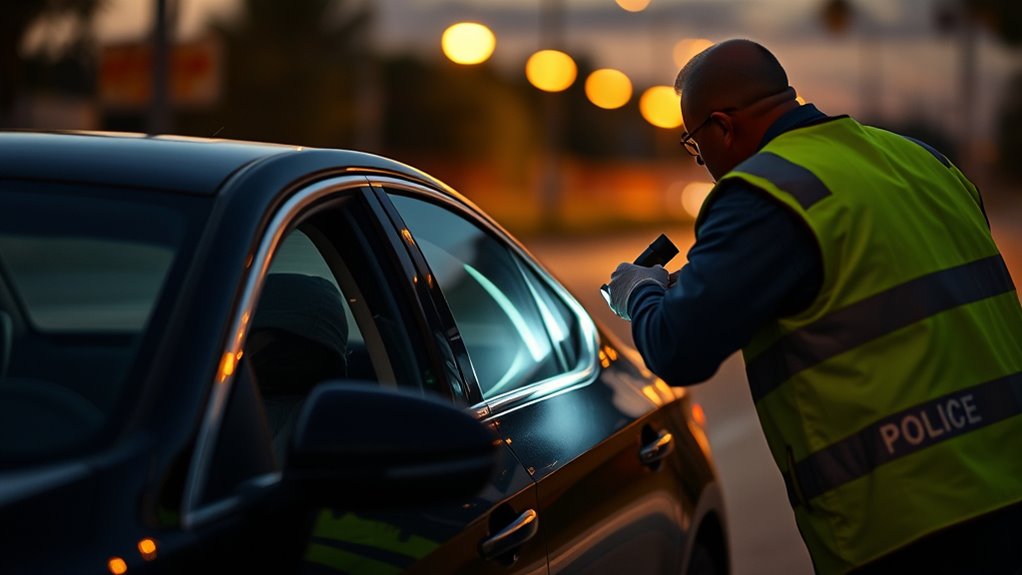During a traffic stop, officers may uncover hidden warrants or illegal items without your knowing, turning a routine check into a serious legal situation. They might notice suspicious activity, use plain view observations, or verify your ID and vehicle info, which can lead to discovering warrants or evidence of a crime. Staying calm and cooperative helps prevent unnecessary searches. If you want to understand how these surprises happen and how to protect yourself, keep going.
Key Takeaways
- Police can discover hidden warrants during routine checks or when verifying driver and vehicle information.
- Suspicious behavior or visible evidence may prompt officers to suspect warrants or illegal items.
- During a traffic stop, officers may request consent to search, potentially uncovering warrants without prior suspicion.
- Plain view observations can lead to warrantless searches if illegal items or evidence of warrants are visible.
- Verification of warrants through vehicle or driver info can lead to immediate arrests, revealing hidden warrants.

Traffic stops can be nerve-wracking, but knowing what to do can make the experience smoother and safer for both you and the officer. When you’re pulled over, the officer’s primary goal is to ensure safety and enforce the law, which often involves evaluating whether they have probable cause. Probable cause means the officer has a reasonable belief that you’ve committed a crime or that there’s evidence of one in your vehicle. This standard is vital because it determines whether they can conduct a search without a warrant. If they believe they have probable cause—say, they smell marijuana, see illegal items, or notice something suspicious—they might initiate a warrantless search of your vehicle.
Knowing probable cause helps determine when police can search your vehicle during a traffic stop.
A warrantless search isn’t automatic; it must be justified by specific circumstances that give the officer reasonable suspicion or probable cause. During a traffic stop, the officer might ask to search your car. You’re not required to consent, and politely declining can sometimes prevent a warrantless search. However, if they do find probable cause—like seeing illegal substances in plain view—they can search your vehicle without a warrant. This can lead to discovering evidence of a crime or, in some cases, a secret warrant that may not have been apparent initially.
What many people don’t realize is that a traffic stop can unexpectedly reveal more than just a traffic violation. If the officer finds evidence of illegal activity, they can escalate the situation, often leading to a search that uncovers hidden warrants or illegal items. Sometimes, an officer might suspect there’s a warrant out for your arrest based on your ID or other information. If they verify that a warrant exists, they can arrest you on the spot, even if your initial reason for stopping was minor. This is why compliance and calm behavior during the stop are vital—they can influence how thoroughly the officer investigates and what they may uncover.
It’s also important to understand that not all searches are lawful. If an officer conducts a search without probable cause or your consent, and no legal exception applies, that search could be challenged later in court. Knowing your rights and remaining respectful can help protect you from unwarranted searches or disclosures of secret warrants. Additionally, understanding search and seizure laws can empower you to better handle such situations. Ultimately, a simple traffic stop has the potential to uncover more than you expect—sometimes revealing hidden warrants or evidence that can greatly impact your situation. Staying calm, respectful, and aware of your rights is your best strategy during these tense moments.
Frequently Asked Questions
Can a Warrant Be Issued During a Routine Traffic Stop?
A traffic stop is like a spark that can ignite surprises. Yes, a warrant can be issued during a routine traffic stop if police find probable cause, such as illegal activity or evidence of a crime. Even without a warrant, they can conduct warrantless searches if immediate safety concerns or other exceptions apply. So, what starts as a simple stop might lead to discovering a secret warrant or other serious issues.
How Often Do Traffic Stops Lead to Uncovering Secret Warrants?
You might be surprised, but traffic stops often uncover secret warrants through probable cause. When officers notice suspicious behavior or evidence, they can conduct warrantless searches, which sometimes reveal hidden warrants. Although it’s not common, these stops can lead to discovering warrants that were kept secret. Typically, police rely on probable cause during stops, increasing the chance that a secret warrant could come to light unexpectedly.
Are Officers Required to Inform Drivers About Existing Warrants?
During a traffic stop, officers aren’t always required to inform you about existing warrants. They prioritize driver safety and law enforcement procedures, which sometimes limits warrant disclosure. However, if they discover a warrant, they may inform you, especially if it impacts your driver privacy or safety. Keep in mind, laws vary by jurisdiction, so it’s wise to stay informed about your rights regarding warrant disclosure during traffic stops.
What Rights Do Drivers Have if They Suspect a Warrant?
If you suspect a warrant, you have rights that safeguard your privacy and legal protections during a traffic stop. You can ask if there’s a warrant, but officers aren’t required to inform you unless you’re under arrest. Stay calm, remain silent if needed, and request legal counsel. Remember, asserting your rights helps maintain your privacy and ensures your legal protections are upheld throughout the process.
Can a Warrant Be Hidden From the Driver During a Stop?
During a traffic stop, a warrant can sometimes be hidden from you, raising privacy concerns. Law enforcement isn’t required to reveal a warrant immediately, and warrant concealment can occur if officers don’t disclose it upfront. While they must show the warrant if they intend to search or arrest, they might withhold it initially. Stay aware of your rights and ask questions if you suspect a warrant isn’t being disclosed.
Conclusion
As you step back into your car, a lingering feeling of unease creeps in. That simple traffic stop, which seemed routine, now feels like a doorway to something much darker. With every turn of the key, you wonder—what secrets might be hiding just beneath the surface? A hidden warrant, an unknown past, waiting silently to be uncovered. Sometimes, a small moment can reveal a world of unforeseen truths—are you ready to face what’s truly buried beneath?









